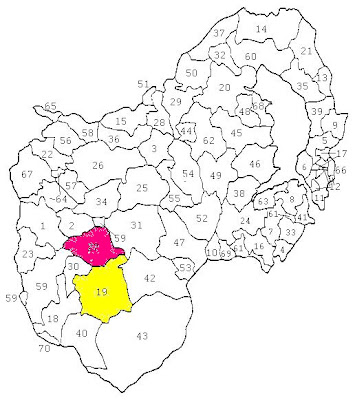
Surname (Households)
McAvoy (53). From the Irish Mac A' Bhuí (: Mac Giolla Bhuidhe) in South Down (Duibhín). Giolla Bhuidhe means 'yellow servant'.
Burns (48) Most likely from the Irish Ó Broin but clearly can be a plantation surname. (From Ciarán Ó Duibhín notes "Pron. ă brin′ or (without preceding forename) ō-brin′ or (most commonly) bran′-ăh (S Armagh, SÓhA)" Ciarán Ó Duibhín).
King (43). Ó Duibhín has King as an anglicisation of Mac a' Rí with the caveat "Possibly a reduced form of a fuller name, such as Mac Conroi or Mac Fhearadhaigh. "
Roney (38). A form of Rooney. From the Irish Ó Ruanaidh, Ó Ruanadha in South Armagh ["Pron. ă roo′-noo (S Armagh, SÓhA) - Duibhín] but very much a Co. Down name.
Doyle (31) - From the Irish Ó Dubhghaill 'descendent of the dark foriegner'. Dubhghall (i.e Dougal) being a forename which originally indicated Norse origin.
Dalzell (25) Not a Gaelic name but a Lowland Scottish Typonymic name, from the Gaelic 'Dail Ghil' "white haugh". A native of Dalzell would be a Dailghileach in Gaelic I have no evidence of this ever being used as a surname.
Ward (25). From the Irish Mac a' Bhaird 'son of the bard'.
Keenan (22) Most likely from the Irish Ó Cianáin 'Descendent of little Cian'. [Pron. (without preceding forename) ă kin′-ăan (S Armagh, SÓhA; so pronounced also in Farney, EÓT) Ó Duibhín]. There is another South Ulster name Ó Caonáin (?), it is possible that this is the name in question.
Kelly (20). From the Irish Ó Ceallaigh 'Descendent of Ceallach'.




